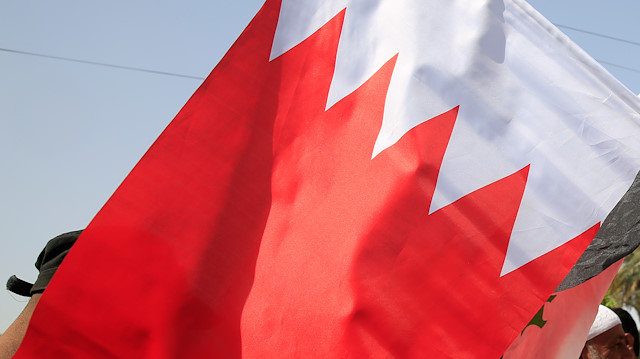Bahrain reopens embassy in Syrian capital after UAE move

Bahrain's embassy in Damascus and the Syrian diplomatic mission in Manama have been operating “without interruption”, the Bahraini foreign ministry said in a statement on Friday, a day after the United Arab Emirates reopened its embassy in Syria.
The statement said it was important that Arab states work to prevent any regional interference in Syria's internal affairs, to help consolidate security and stability in the country.
Bahraini Foreign Minister Khalid bin Ahmed Al Khalifa said in a Twitter post that the kingdom had not broken off diplomatic ties with Syria “despite difficult circumstances” — a reference to Syria’s nearly eight-year-old civil war.
“Syria is a major Arab country in the region, we did not cut ties and it did not do so ... We stand with it in protecting its sovereignty and its territory from any violation,” he tweeted.
Bahrain is a small island nation that hosts U.S. Fifth Fleet, which had to call in Saudi troops in 2011 to quash Shiite mass protests, which started as part of the so-called “Arab Spring”.
Unlike its neighbors, Oman maintained diplomatic ties with Damascus while Kuwait opposed arming rebels fighting to topple the Bashar al-Assad government and has led a humanitarian fundraising campaign for Syria through the United Nations.
Early in the multifaceted Syrian conflict, which involved hostilities between various domestic forces and a strong influx of foreign fighters, several Persian Gulf Arab states shut down their diplomatic missions in Syria. The country was also expelled from the Arab League in 2011, as Riyadh and Doha backed anti-government Sunni forces trying to topple the Alawite-dominated government in Damascus. Now the diplomatic ties are being restored.
Other Persian Gulf Arab states are expected to shift their positions and normalize ties with Assad's government.
Syria’s membership of the Arab League was suspended seven years ago. An Arab diplomat, speaking on condition of anonymity, told Reuters last week he believed a majority of members wanted Syria to be readmitted.
The statement from Bahrain’s foreign ministry said it was important that Arab states work to prevent any regional interference in Syria’s internal affairs, to help consolidate security and stability in the country.
In October, Bahraini Foreign Minister Khalid bin Ahmed al-Khalifa was seen warmly greeting his Syrian counterpart Walid al-Muallem at the United Nations General Assembly in New York.
Khalifa later defended the meeting in an interview, saying it was unplanned and calling Syria a “brotherly, Arab nation”.
“What happens there concerns us more than anywhere else in the world. It is not right that regional and international players are involved in Syria while we are absent,” Khalifa said.
Earlier in December, Sudanese President Omar al-Bashir became the first Arab head of state to visit Syria since the war began.
Trade between Jordan and Syria has resumed in recent weeks after the reopening of a border crossing in October and the first commercial flight from Syria to Tunisia in seven years took off on Thursday.
After nearly eight years of war, Assad has recovered control of most of Syria with support from Russia, Iran, and Iranian-backed Shi’ite Muslim groups such as Lebanon’s Hezbollah.
His military advances gathered pace this year with the defeat of the last big rebel enclaves near Damascus and recovery of the southwestern region.
Tehran has been a staunch supporter of Assad's government and has expanded its military footprint in Syria throughout the course of the conflict. Along with Russia, which also supports Assad, and Turkey, which does not, Iran has played a central role in peace negotiations on Syria.
Meanwhile, in December, United States President Donald Trump announced the withdrawal of all 2,000 U.S. troops from Syria, clearing the path for Turkey to launch planned combat operations into northeastern Syria against an alliance of Kurdish and Arab groups that it views as an extension of an armed group fighting inside Turkey.
Trump also claimed that Saudi Arabia had agreed to finance Syria's enormous reconstruction needs.
“Saudi Arabia has now agreed to spend the necessary money needed to help rebuild Syria, instead of the United States,” Trump said on Twitter.
It turns out that Trump, under fire for suddenly announcing the withdrawal of U.S. troops from Syria, was highlighting a commitment that the Saudis made several months ago.
An official at the Saudi embassy in Washington told CNBC that the kingdom has not made any major new financial pledge to Syria since August. That is when the State Department announced that Saudi Arabia had committed $100 million to a fund to stabilize areas of Syria liberated from ISIS terrorists by a U.S.-led coalition.
On Wednesday, the White House clarified that Trump’s tweet was not meant to announce a new commitment from Saudi Arabia.
The State Department announced in August it was canceling $230 million in aid earmarked for stabilization and early recovery efforts in northeast Syria. The department said the funds were no longer needed because the administration had secured about $300 million for the same purpose from Saudi Arabia, the United Arab Emirates and other nations, though even that sum would be a fraction of what is needed to rebuild the war-torn nation.
The same day, Trump called the $230 million in proposed U.S. aid “ridiculous.” The president had long called on other coalition members to pitch in more money.
A United Nations agency says the conflict has cost Syria $388 billion in lost economic output and damage to infrastructure and homes. The Syrian president estimates his country needs $250 billion to $400 billion to rebuild, according to Russia’s state-owned TASS news agency.
It remains to be seen who will shoulder the burden of those costs.
(Source: Al Jazeera, RT, Reuters, CNBC, euronews, EFE, Times Daily)
